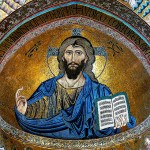You and I were born in an age shaped by scientific thinking. We find it hard to accept that there might be ways of knowing other than through science — the proof of hypotheses through experimentation. It is a sort of cultural mythos, this devotion to science. It is a religion without a temple. We […]
What Is and Isn’t Reformed Theology? (Heidelberg Catechism Q. 23)
When I teach about Reformed theology, I often start by showing a pyramid of three layers. Like that one on the far end of the row of Queens Pyramids at Giza. Just picture the bottom layer a lot thicker. The big foundation layer is core Christian teachings — Things like our understanding of God — the […]
Finding a Life-Giving Approach to the Bible (part 7, conclusion): Process & Goal
And so we come to the end of the classic book on lectio divina by Guigo II (d. 1188), The Ladder of Monks. The idea of a ladder is key to understanding his approach to the Bible — despite all the food metaphors I’ve noted in these posts. He might have done better still with a spiral […]
Finding a Life-Giving Approach to the Bible (part 6): Contemplate Upon It
Contemplation is when the mind is in some sort lifted up to God and held above itself, so that it tastes the joys of everlasting sweetness.” That is Guigo II (d. 1188) talking about the fourth and final step of lectio divina, the spiritual reading of Scripture. In his classic little book he compares the process to […]
Why Reformed Theology? (via Heidelberg Catechism Q. 18)
I find Christian faith coherent, intellectually rigorous, and deeply soul-satisfying. Why? Probably because I have been fed a hearty diet of Reformed Theology. I did my doctoral dissertation on John Calvin, the Reformed theologian who shaped the tradition more than any other. For a good long while I’ve regularly taught the theological summaries that make up […]
- « Previous Page
- 1
- …
- 14
- 15
- 16
- 17
- 18
- …
- 36
- Next Page »



